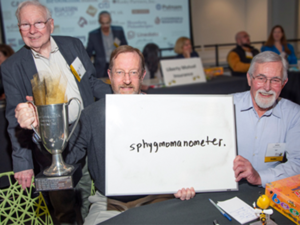Tips And Tricks to Win a Spelling Bee
Written by Lisa M. Brooks, Ed.D., Principal Director, Commonwealth Learning Center’s Professional Training Institute, and First Literacy Workshop Presenter
 Get your pencils ready – it is time to gear up for First Literacy’s 33rd Annual Spelling Bee. The Spelling Bee is a fun way to test your spelling skills in a team atmosphere while supporting adult literacy!
Get your pencils ready – it is time to gear up for First Literacy’s 33rd Annual Spelling Bee. The Spelling Bee is a fun way to test your spelling skills in a team atmosphere while supporting adult literacy!
Spelling Bees date back to the 1920s, but spelling games are on the rise again. Between Words with Friends, the New York Times Wordle, and good old fashioned Scrabble, people of all ages are puzzling their way through English words. Since English vocabulary encompasses words from Old English, Latin, Greek, French, Native American languages, and others, it can seem daunting to learn how to spell words without referencing spell checker. Fear not! Here are some tips to consider as your team prepares for the First Literacy Spelling Bee:
1) Review Basic Spelling Generalizations
There are basic spelling rules and generalizations in English.
- One rule involves the use of double letters before adding a vowel suffix to keep a vowel from saying a long vowel sound, as in dinner versus diner or grabbing versus grading. The challenge comes, however, when there are two syllables in the word before the vowel suffix. Why do words like regrettable, omitting, and controlled double before the suffix, but piloted, galloping, and traveler do not? If the accent is on the second syllable in the two-syllable word, you double the consonant before adding the vowel suffix.
- Some spelling generalizations are related to the part of speech. Consider that we spell the ending /us/ syllable as either <us> or <ous>. Use <us> to spell nouns – asparagus, syllabus, hibiscus. Use <ous> to spell adjectives – copious, hazardous, outrageous. Fun fact: The winner of the first Scripps National Spelling Bee in 1925 was 11-year-old Frank Neuhauser, who won by correctly spelling gladiolus. When spelling words that end in /kul/, use <cle> for nouns – cubicle, spectacle, vehicle, and use <cal> for adjectives – whimsical, theatrical, symmetrical.
2) Consider Etymology
There are particular orthographic concepts attributed to various languages of origin.
- In French, the sound /sh/ is spelled with <ch> as in chauffeur.
- From the Greek, we have /k/ spelled <ch> as in chaos and /f/ spelled as <ph> as in sulphur.
- In Latin words, prefixes can change like chameleons for euphony, or ease of pronunciation. For example, the prefix in- becomes il- as in illegal or im- as in immoral. This is true for the prefix sub- changing to sup- as in supportive, or suc- as in succumb. This phenomenon explains the double letter at the start of many words.
- Think about derivatives. Many words in English have multiple meanings, and understanding the root of the word can help you understand its various meanings and spellings, as in sign – signature, insignia, assignment or jud – judicious, adjudicate, prejudicial.
3) Memorize and Practice
- There are some words that sound alike that we need to memorize: accept and except, allude and elude, compliment and complement, stationary and stationery, principle and principal. Writing targeted practice sentences can help you memorize: In her annual review, her supervisor’s positive written compliment was a wonderful complement to the salary increase.
- In the age of podcasts and audio books, we may not read printed books or text as much as we used to. Good spellers are good readers, and habitual pleasure readers have more exposure to how words “look.” Set a goal to read more books in 2023 (like this young father, who is teaching himself to read by tackling 100 books on Tik Tok this year.)
The Annual Spelling Bee brings awareness to and funding for First Literacy’s work to support adult learners and adult educators. The Bee further reminds us that we can all keep learning! Practice, practice, practice, and we’ll see you on March 30th!
Lisa M. Brooks, Ed.D., is a Principal Director at Commonwealth Learning Center’s Professional Training Institute. She is also a presenter for many First Literacy professional development workshops. Materials from her workshops, such as Introduction to Morphology and Literacy Basics for Adult Learners, can be found on our Resources for Educators page.
